





Ask me sometime about the few months I spent after college trying to sell cars to support myself in my seminary studies. It was a disaster—not because I’m hapless and helpless when it comes to life, but because I simply didn’t believe in what I was doing. But how different it was with my ministry!
Ask your own pastor sometime about what keeps him ticking, and I’m certain you’ll hear that he’s motivated by the fact that there’s simply nothing more precious in this life and the next than Jesus and His blood and righteousness. And he knows there’s only one way people can receive this precious gift—through the Word, whether preached or in the Sacraments. And so he is singlemindedly devoted to fulfilling his vocation to proclaim the Word and administer the Sacraments.
In other words, he is entirely confident in our Godgiven confession of Christ and His Word. He stares death in the face and tells loved ones, “This child is not dead, but sleeping” (Mark 5:39). He sits with those hounded and surrounded by sin and declares the removal of that sin for Christ’s sake as far as East is from West (Psalm 103:12). He pours water on the heads of those recently born to give them, of all things, a new birth, the birth in Christ (John 3:3–5; Titus 3:5–7; Rom. 6:4–8), to give those with an earthly father a heavenly Father (Gal. 3:27, 4:6).
As you’ll read in this issue of For the Life of the World, a confident confession takes vicars who’ve never
preached to a congregation into a pulpit to proclaim God’s Word (Rom. 10:17). It takes pastors into the midst of “sophisticated unbelief” on college and university campuses to proclaim the foolishness of the cross (1 Cor. 1:18–25). It takes pastors to the doorways of the unknown, that by all means they might save some (1 Cor. 9:22). And it takes deaconesses to the depth of human misery with the mercy of Christ.
Witness any of these things, and myriad more like them, and you come to realize the deep conviction—the confidence in our confession—with which our graduates address themselves to the work of their calling.
We’re intentional about that. You could say that in some sense everything students take in on campus is meant to corroborate our confession, and to give them the kind of God-wrought confidence in Christ and His Word that propels them in their faithful work in the Lord.
Read on and enjoy!
In Christ,

Jon S. Bruss President Concordia Theological Seminary, Fort Wayne




The annual CTSFW wall calendar was mailed in November to CTSFW alumni and synod congregations. A limited number of additional calendars are available. To request your calendar(s), please contact Colleen Bartzsch at (260) 452-2150 or Colleen.Bartzsch@ctsfw.edu.
• Front Cover: The president’s chain of office, which was featured on the cover, includes the seminary’s motto, “Preach the Word,” in Greek, but the Greek is incorrect, with an alpha instead of a lambda in λόγον (logon; “word”). It’s time for a new chain of office.
• Back Cover: It’s Nicaea, not Nicea, an error that escaped our notice in the Symposia ad on the back cover.
WINTER 2024 VOL. 28, NO. 4
PRESIDENT JON S. BRUSS PUBLISHER
KRISTINE S. BRUSS
CARRIE M. O’DONNELL EDITOR PUBLISHER ASSISTANT
COLLEEN M. BARTZSCH STEVE J. BLAKEY PRODUCTION MANAGER ART DIRECTOR
For the Life of the World is published by Concordia Theological Seminary Press, 6600 N. Clinton St., Fort Wayne, Indiana 46825. No portion of this publication may be reproduced without the consent of the editor of For the Life of the World by email at FLOW@ctsfw.edu or (260) 452-3153. Copyright 2025. Printed in the United States. Postage paid at Berne, Indiana.
SUBSCRIPTION INFORMATION: For the Life of the World is mailed to all pastors and congregations of The Lutheran Church—Missouri Synod in the United States and Canada and to anyone interested in the work of Concordia Theological Seminary, Fort Wayne. To manage your subscription, please email FLOW@ctsfw.edu or call (260) 452-2150.
Unless otherwise noted, all Scripture verses are from the English Standard Version (ESV).
James Woelmer
We plant and we water, but only the Holy Spirit causes faith to be created through the Gospel (1 Cor. 3:6; 12:3). Our job is simply to be faithful in the proclamation of God’s Word.
Todd
A. Peperkorn
One of the characteristics we instill in our future pastors is confidence in our confession of faith, which comes from knowing who you are in Christ, what you are there to do, and having the capacity to do it. Field experiences play a central role in building this confidence.
Jared DeBlieck
As a campus pastor at a public university, I strive to catechize my students to see the world for what it is—a place lost to itself in a spiritual nosedive, spinning out of control at an alarming rate. My aim is to encourage confidence in our doctrine and practice, to better equip their belonging in Christ here.
Cover The Rev. Matthew Wietfeldt, Assistant Vice President of Admission and Christ Academy Director at CTSFW, reads the Gospel lesson in a Divine Service at Redeemer Lutheran Church in Fort Wayne, Indiana.
(Photo: Steve Blakey)



To God be all the glory.
By James Woelmer
When I was a full-time farmer, I told my county agricultural agent that I would be going to the seminary to pursue the pastoral ministry. He said that I will always be planting the seed, meaning that I will always be sowing the Word of God (Luke 8:4-15). Paul planted, Apollos watered, but God gave the increase (1 Cor 3:6).
Even now, I plant the seed of God’s Word and talk to others about Jesus, but it is ultimately God who gives the increase through His Word and Sacraments. We cannot convert anyone, but the Holy Spirit brings people to faith in Christ through the proclamation of the Gospel. To God be all the glory.
In 2023, I accepted the call to Christ Lutheran Church in Manhattan, Kansas, a small church in the middle of a suburb. Since I was new to the area, I took the opportunity to knock on doors and introduce myself and my church to the neighborhood. Many people were friendly and welcomed me to their community. When I asked them what church they attend, they gladly shared what church they belong to.
Though I have found some who were not interested, I have also found many who were open to hearing the Gospel. When a woman told me that her husband was hospitalized, I visited him at the hospital and again at home. They attended our church the next Sunday. I catechized them, and they eventually joined our church.
During another visit, a man invited me into his home and told me that he was on a waiting list for a lung transplant. We talked about theology, and I prayed with him and gave a house blessing. Another man, who did not grow up in the church, welcomed me back and allowed me to teach him about Jesus.
When I visit mothers with small children, I ask them if their children are baptized. If not, I talk with them about the blessings of Baptism and encourage them to bring their children to the font. I have catechized one couple in their home, and I have visited with fifteen families who previously attended a Lutheran church.
“We cannot convert anyone, but the Holy Spirit brings people to faith in Christ through the proclamation of the Gospel.”
About thirty percent of the people I talked to attended a church at one time but do so no longer. Some mentioned that they don’t go to church anymore because their church has gone “woke,” while others talked about how their church was too legalistic or how they were hurt by false doctrine. In one conversation with a woman who was agnostic, I spoke about the clarity of Holy Scripture and the trustworthiness of the eyewitness testimonies to Christ’s bodily resurrection. In another conversation with someone who said that they are spiritual but not religious, I spoke about the body and blood of Christ in the Lord’s Supper for the forgiveness of sins. In my conversations with the unchurched, I always responded by applying the Gospel to each person’s background or beliefs. I also kept the conversation focused on Christ— His person and work.
Finally, I gave them information about our church and a copy of Luther’s Small Catechism, invited them to our Divine Service, and asked for their name. When I got home, I wrote them a letter thanking them for our visit. I also had my members write letters to the unchurched, inviting them to our Christmas, Holy Week, and Easter services.
When I walk the neighborhood, I wear my collar to help people recognize that I am a pastor. I don’t carry a clipboard because I don’t want it to look like I am taking a survey. I simply carry a few Small Catechisms in my pocket and a small notepad for recording information. I have found that forty to fifty percent of households are not home. Instead of leaving information at their door, I make sure to come back to their house later on in order to talk to them in person.
Every three to six months, I visit prospective members again. I ask them how they are doing. We chat for a little while. Then I let them know that I would love to be their pastor and to take care of them with the Gospel. I give them a copy of Sunday’s bulletin and my sermon, and I invite them to church.
In the Parable of the Wedding Banquet, the king said to his servants, “Go therefore to the main roads and invite to the wedding feast as many as you find” (Matt. 22:9). Just as Philip invited Nathanael to see Jesus (John 1:46), so also am I proactive in inviting people to the Divine Service. I am patient with them, knowing that the “Spirit blows where it wishes” (John 3:8) and that they might come to church according to God’s way and time. And when they do, I will recognize them and know their name.
When fellow pastors hear about what is going on in my community, they ask with a little trepidation about how much resistance I get. In truth, it’s very little. Even the unchurched are polite. Out of the 872 people I visited, only two opened the door, saw that I am a pastor, and then shut the door. We shouldn’t seek persecution but count it all joy if it comes. Jesus has warned us that we will suffer for the sake of the Gospel (Matt. 5:11; John 15:18–21).
I have found great joy in talking with people about repentance and the forgiveness of sins offered to them on

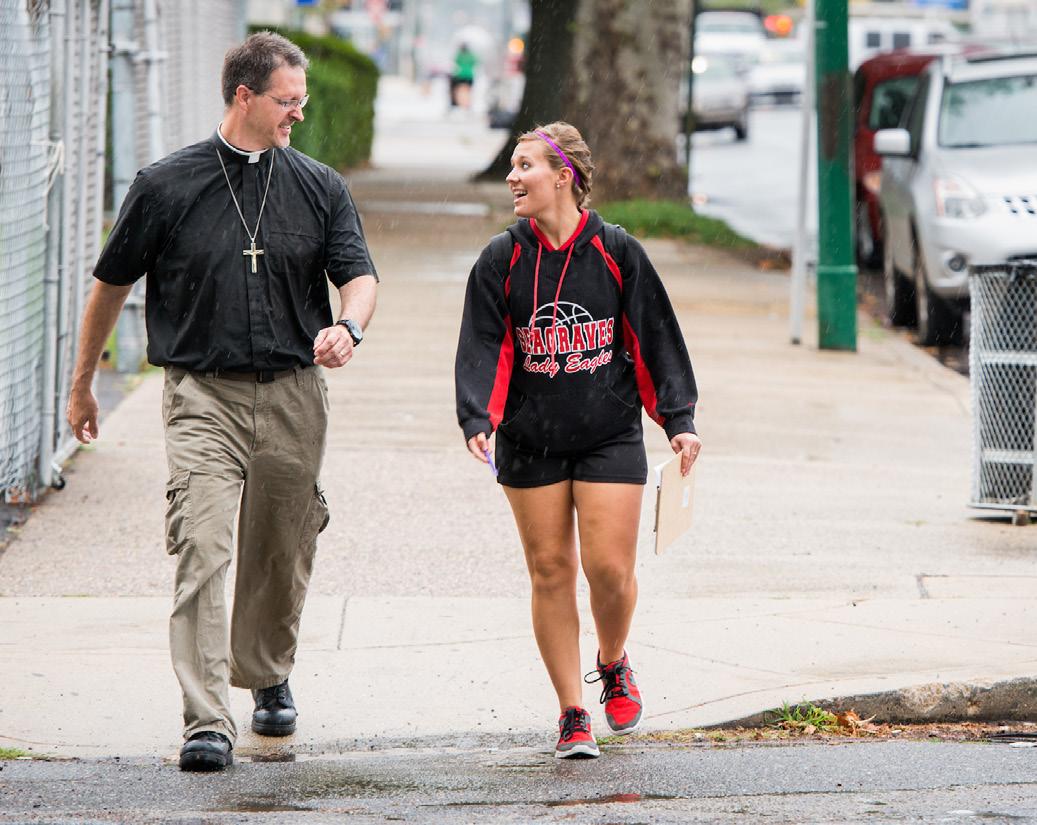
account of Christ’s death and resurrection. Unfortunately, modern evangelism efforts focus on people’s subjective feelings (i.e., what Jesus means to me) rather than on the objective work of Christ for the salvation of mankind. They talk about their church’s programs rather than Christ as our Savior from sin.
We plant and we water, but only the Holy Spirit causes faith to be created through the Gospel (1 Cor. 3:6; 12:3). Our job is simply to be faithful in the proclamation of God’s Word. We are not ashamed of the Gospel, for it is the power of God unto salvation for all who believe (Rom. 1:16). The Gospel has the power to convert from unbelief to faith in Christ.
Visiting people at their homes might be easier in some places than in others, but it’s nonetheless an important part of ministry. It’s also important for the pastor to talk to

visitors on Sunday morning and look for ways the church can further the Gospel in their community. In this way, the pastor sets the example for his flock.
Living in a broken world, people are searching for truth and meaning in life. We have what they need, namely, peace in Christ and comfort in the Gospel. It is a joy to talk with people about Christ’s death and resurrection for our salvation. It is a joy to see the Holy Spirit convert people from unbelief to faith in Christ through the Gospel. It is a joy to catechize them and to receive with them the body and blood of Christ at the altar.
To God be all the glory.

The Rev James Woelmer is pastor of Christ Lutheran Church in Manhattan, Kansas.
God’s Word Does What It Promises.
By Todd A. Peperkorn
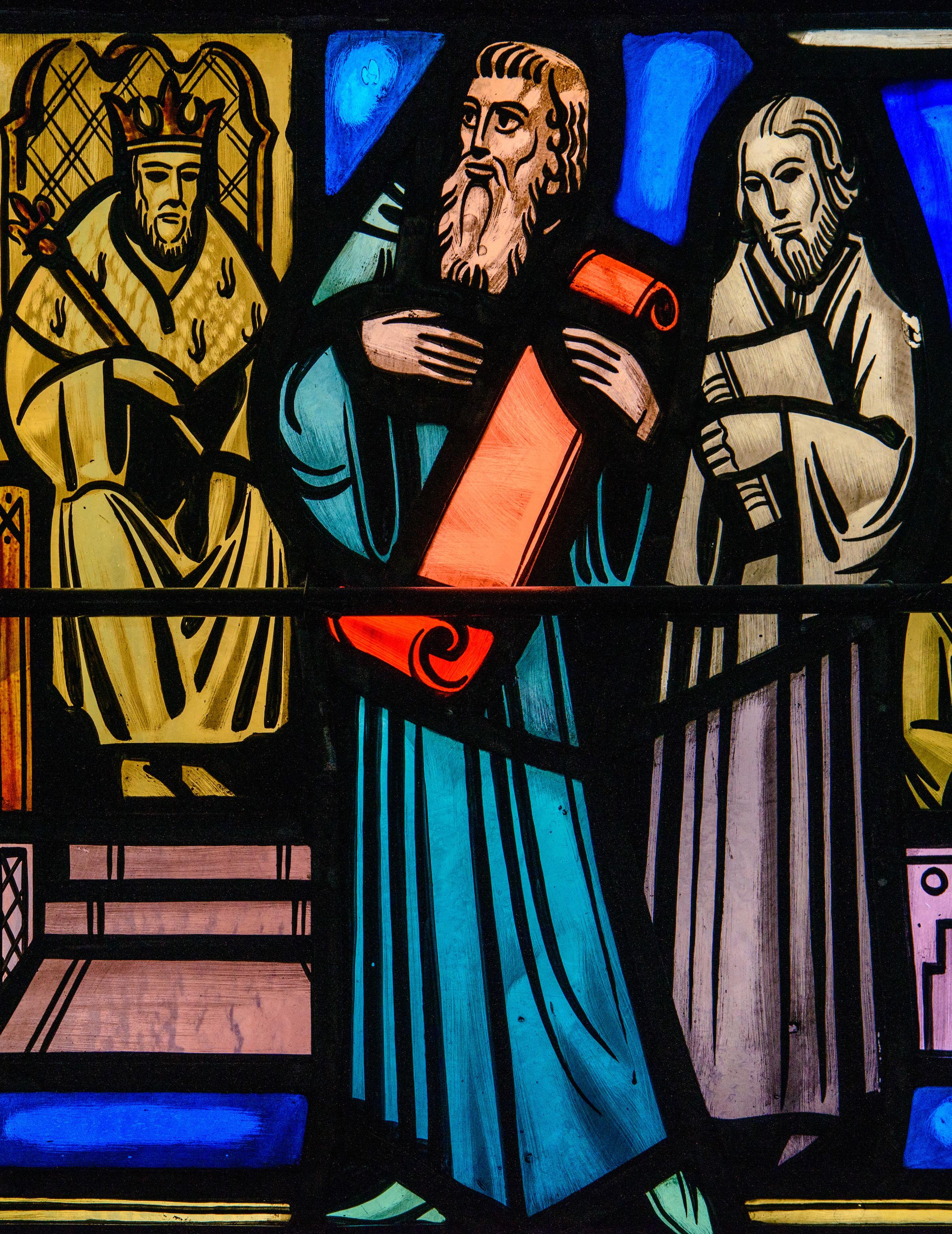

One of the characteristics we instill in our future pastors is confidence in our confession of faith, which comes from knowing who you are in Christ, what you are there to do, and having the capacity to do it. It is sometimes hard to measure, but it is very easy to spot if it is present or if it is missing.
St. Paul talks about this in 2 Corinthians when he writes,
You yourselves are our letter of recommendation, written on our hearts, to be known and read by all. And you show that you are a letter from Christ delivered by us, written not with ink but with the Spirit of the living God, not on tablets of stone but on tablets of human hearts. Such is the confidence that we have through Christ toward God. (2 Cor. 3:2–4)
What we seek to instill is not confidence that could be confused with arrogance. That kind of confidence is never really helpful for the undershepherd in Christ’s Church. Arrogance and pride come from thinking too highly of oneself and too little of others. No, the confidence we are talking about is confidence that the Word of God does what it says, and that Christ always keeps His promises. My vocation as a pastor is not to defend Christ because He is weak and needs my help. Rather, we confess the faith in confidence because Christ’s promise does not waver when things are hard. His promise goes out, “I am with you always, to the end of the age” (Matt. 28:20).
“The confidence we are talking about is confidence that the Word of God does what it says, and that Christ always keeps His promises.”
But how do you instill confidence in a good confession? Probably the best way to do that is through experience. Field education, the vicarage, and other experiential opportunities (e.g., mission trips, internships, volunteer work) are invaluable elements of the formation process. Here are just three examples from our current student body.
Vicar Jon Poppe is serving this year at Grace Lutheran Church in St. Petersburg, Florida. Pastored by Rev. Kevin Loughran (CTSFW 1993), Grace is a congregation in one of the fastest growing parts of the country. It is sometimes hard to keep track of all the comings and goings of people on the Florida coast. This is even more true when not one but two hurricanes hit within the span of two weeks.
How do you demonstrate a confident confession in the face of such tragedy? Vicar Poppe was faced with a somewhat tricky text from Mark 10, the rich young ruler, in a sermon he preached after Hurricane Milton struck.
How do we encourage generosity in the face of hardship while at the same time providing comfort for those who are hurting? Near the end of his sermon, Poppe said,
Today’s reading calls us to destroy the idols in our lives—whether wealth, government, sports, or science. These gifts are not inherently evil, but when they become the focus of our trust, love, or fear, they take God’s rightful place in our hearts. For example, prioritizing a sports game over worship or trusting in modern medicine more than God’s providence can reveal misplaced devotion.
Even as we are warned against idolatry, we are reminded of the completeness of God’s promise. Salvation, which is impossible for man, has been made possible through Jesus Christ. The Holy Spirit, given to us in Baptism, opens our ears to hear Jesus’ call to follow Him and trust in His promises.
This is confidence that the Word of God will do what it promises.
Seminarian Aaron Wade is a second-year student from Seymour, Tennessee. When he found out about a summer field work opportunity in evangelism, Aaron jumped at the chance.
Prince of Peace Lutheran Church in Grabill, Indiana, is a small community just north of Fort Wayne. Thanks to the Indiana District Summer Evangelism Internship program, Aaron was able to knock on 2,000 doors, develop promotional materials for the congregation, participate in the nearby Leo Farmer’s Market, attend city council meetings, and teach ten classes on individual witnessing to members of the congregation.
This has led to a change in attitude on the part of the congregation. Aaron is now doing his regular field work at Prince of Peace and continues to work with their vicar, Kenny Klaehn, and Pastor Robert Eickmann to bring the love of Christ to this community.
Vicar Josiah Junkin is from Newman, California, and currently serves as a vicar at Faith Lutheran Church in LaCrosse, Wisconsin, with Pastor Jacob Eichers (CTSFW 2017). In addition to his normal duties as a vicar, Josiah is also working as a church planter and evangelist for the Viroqua community near La Crosse, Wisconsin.
He is getting quite a lot of on-the-job training in church planting through this work. It has included everything from extensive demographic studies, getting to know the community, looking at the religious layout of Vernon County, and trying to find the elusive “viability” levels for starting a Lutheran Church—Missouri Synod (LCMS) parish in Viroqua. Vernon County currently has no LCMS congregations. There are, however, numerous ELCA and some WELS congregations. How do we minister to the people of this community in ways that are faithful and merciful?


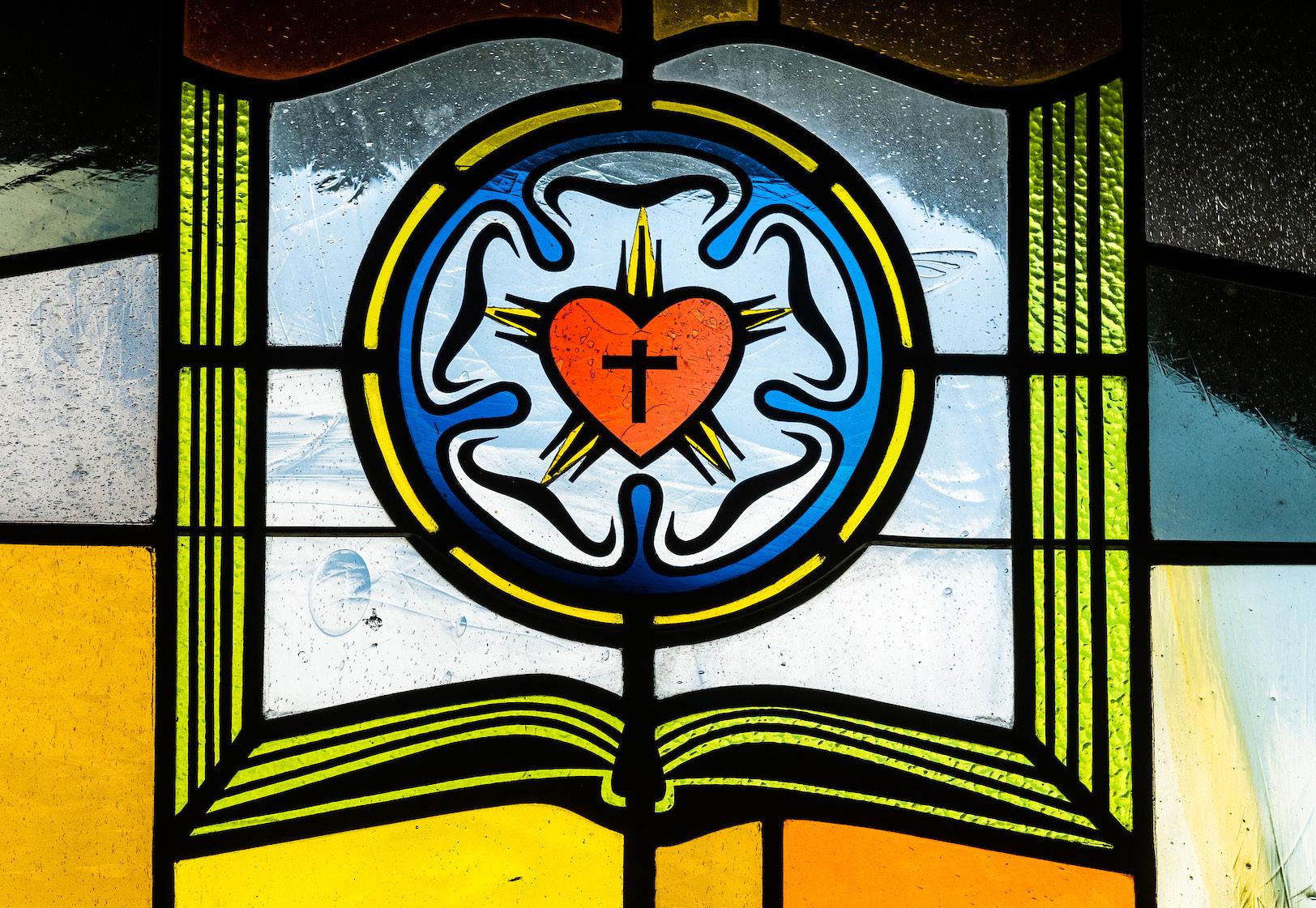

Counter-clockwise from top right: CTSFW student Aaron Wade works as a summer evangelism intern at Prince of Peace Lutheran Church in Grabill, Indiana; CTSFW Vicar Josiah Junkin at the Viroqua Chamber Bash in Viroqua, Wisconsin; CTSFW Vicar Jonathan Poppe, left, and the Rev. Kevin Loughran (center) of Grace Lutheran Church in St. Petersburg, Florida, make an onsite visit after Hurricane Helene struck last fall.
One of the questions of interest is the rise of “online” attendance at churches. Many of the congregations in the area are now counting online participation as a part of their attendance statistics, which presents a skewed picture of the priority of being in the Divine Service.
By planting a church in communities like Viroqua, the LCMS can be of service to communities that have stagnated in faith and life and can be a positive influence on the continued growth of small-town America.
Each of these young men represents the future of the ministry of the LCMS. There are many people who have contributed to their formation toward becoming pastors. At the end of the day, though, it is Jesus Christ through
His Word that will shape them into the pastors He wants them to become. As the author of Proverbs puts it so well, “for the Lord will be your confidence and will keep your foot from being caught” (Prov. 3:26).
By God’s grace, the future is bright. May He continue to shine His light upon the Church here in the United States and beyond!

Dr. Todd A. Peperkorn serves as Assistant Professor of Pastoral Ministry and Missions, Director of Vicarage, and Director of Pastoral Formation Programs at Concordia Theological Seminary.

Our confident confession is in the Lord’s hands, and with his Word it will not return void.
By Jared DeBlieck
Today the Church, particularly in the West, has seen the rising stagnation of believers. A Gallup poll reported that in the United States, belief in God has dropped from 87% in 2017 to 81% in 2022.1 That same year, Pew Research modeled the future of religion in America as overwhelmingly secular in its current trajectory. The study focused on the key demographic, 15- to 29-year-olds, as the age range in which religious switching most often takes place. In particular, “31% of Americans who were raised as Christians become religiously unaffiliated—a group that includes atheists, agnostics or those who describe their faith as ‘nothing in particular.’”2
The youth and young adults who spend time in this spiritual wilderness wander grievously, not only critiquing religion but often on a mission against the world where faith exists. This is post-modernity. Born again in the image of influencers, the adolescent spiritual impulse is, reflexively, to destroy the old and erect the different—different values, practices, and lifestyles. Even while their world has touches of the old world, it strives toward an ambiguity of indiscriminate features that are neither normed nor common. The current debates over gender fluidity and abstract beauty come to mind. These statistics are noticeable when comparing students who are confident in their Lutheran confession to their campus peers. Among the religiously unaffiliated going off to college, fidelity to God’s Word is more of a mystery than the devotion to biological impossibilities. However, I detect an even more disastrous feature that even our good Christian young adults have trouble combating. The ivory tower of academia does a great job of keeping any number
of Christian beliefs in muted submission. Opposing views, especially from the churched, are intolerable heresies. It should be no surprise when our catechized go off to college and turn and adopt the approved religion of the contemporary world. Students want to belong; therefore, it is imperative that parents and pastors work together to foster a Christ-centered college experience.
As a campus pastor to a public university, I strive to catechize my students to see the world for what it is—a place lost to itself in a spiritual nosedive, spinning out of control at an alarming rate. My aim is to encourage confidence in our doctrine and practice, to better equip their belonging in Christ here. When they leave college, I want them to be a blessing for their congregation wherever they end up. I want Jesus’ death and resurrection to be as real for them as biology, engineering, or agronomy. I urge them to see the world as changing, but Christ as the same yesterday, today, and forever (Heb. 13:8).
“The confident confession in action within a campus ministry is not unlike any other Lutheran church that desires faith and faithful living.”
It is an ongoing challenge for them and their peers, as God is often relegated to the mythos of a former era that is no longer. Students are tempted by a new proselytization taking place, an anti-gospel, a de-crucified Christ, a post-Christianity.


Left: The Rev. Jared DeBlieck, senior pastor of University Lutheran Church in West Lafayette, Indiana, gives a presentation at Concordia Lutheran High School (CLHS) in Fort Wayne, Indiana. Right: DeBlieck preaches in chapel at CLHS.
The Christian message is not just losing its influence but is considered categorically debunked. Post-Christianity (a term often overused and underdefined, yet nonetheless useful) marks a significant shift in societal beliefs, motivations, and practices away from the teachings of Jesus Christ. In areas of its prevalence, specifically the European West, it signals a near or even utter irrelevance of Christian beliefs in decision making, even if individuals maintain formal church memberships (i.e., state church affiliations). The term highlights the transition from a society where belief in God was widely accepted to one where it is merely one option among many. Again, this shift is particularly significant in Europe, where Christianity was once the dominant religion. The United States is following a similar path and may soon reach that threshold. The need for a confident confession on our college campuses is clear and pressing, and the current de-Christianization among college students warrants a concurrent response by the church.
Recently, I had the pleasure of visiting Concordia Lutheran High School in Fort Wayne. I drove out to preach at their chapel, visit with the Christian Leadership class, and present to students during their lunch hour. Many of the students indicated they were headed to one of our Concordias; a similar number chose Purdue, IU, and other state schools. They were curious about our campus church and what it was like. Did anyone attend? What does it look like? Basically, why should I go there if I go to Purdue?
I did not quote the statistics that they were in the vulnerable age range of becoming religiously unaffiliated or explain the technical features of secularization. They intuitively feel these things, even as they may be unaware of their persuasion. Instead, I told them who we are. Our confident confession in action is most pronounced in its simplicity. At University Lutheran Church in West Lafayette, we are biblical, confessional, liturgical, and
Lutheran. We live out our baptismal identity in Divine Services, Bible studies, and prayer. Our life together begins weekly at the Lord’s Table and extends into the Sunday night family meal. Our discussions include formal studies and pastoral care, table talks, and impromptu deep dives. We pray together and play together, and we serve God and neighbor, devoting ourselves to each other’s needs and to those who do not know Christ as we know him.
The confident confession in action within a campus ministry is not unlike any other Lutheran church that desires faith and faithful living. As Christianity’s influence dwindles in the West, culture ventures into unknown frontiers. Fostering faith-filled relationships and belonging, particularly within church communities, is the way forward for the formation of religiously affiliated children through their young adulthood, and beyond. The post-Christian landscape is ultimately in God’s hands, so what lies before us is the godly use of those relationships that he has put in front of us. Confidence is faith (con + fides), and faith is born anew by the Spirit. Let us rejoice then that our confident confession is in the Lord’s hands, and with his Word it will not return void!

The Rev. Jared DeBlieck is senior pastor of University Lutheran Church in West Lafayette, Indiana, and a PhD in Missiology candidate at Concordia Theological Seminary, Fort Wayne.
1 Jeffery M. Jones, “Belief in God in U.S. Dips to 81%, a New Low” Gallup Poll, n.d., accessed February 20, 2023, https://news.gallup.com/ poll/393737/belief-god-dips-new-low.aspx.
2 Alan Cooperman, “Religious ‘Switching’ Patterns Will Help Determine Christianity’s Course in U.S.,” Pew Research Center, n.d., accessed October 20, 2022, https://www.pewresearch.org/fact-tank/2022/09/29/ religious-switching-patterns-will-help-determine-christianitys-course-in-u-s/.
By Arthur A. Just Jr.
If God’s will for us is to be united to Christ by Baptism and faith here on earth so that we might be united with him forever in heaven, then evangelism is nothing more than bringing those who don’t know Christ to the place where they might have communion with him.
Christ is present in his flesh to have communion with us in the Divine Service where by faith we receive the gifts of his presence—forgiveness, life, and salvation—that is, release from our sins, a life now defined by his life, and rescue from our enemies. “Faith is the divine service (latreia) that receives the benefits offered by God” (Apology, IV 49).
Faith responds in love in the Divine Service first to God and then to our neighbor because of our reception of these gifts that come from our communion with the flesh of Jesus. In the Divine Service, we express this love to God and our neighbor in many ways. We confess our sins with those who believe as we do, pray with them, sing with them, and receive the gifts of Christ with them by hearing his Word and receiving his body and blood as members of the body of Christ.
How can we demonstrate our love for our neighbors who do not know the gifts of God? Here is where evangelism and missions are properly placed, not as the essence of the Church, but as what the Church does. Our greatest act of love to our unbelieving neighbors is to bring them into the liturgical assembly to receive the gifts of salvation so they might be united to Christ and have communion with his flesh. Evangelism is an act of love, inspired by faith, that receives the gifts in the liturgy, to go out to the highways and byways (Luke 14) and bring our lost neighbors into the liturgy so they may behold the presence of Jesus Christ and receive the gifts of the Gospel proclaimed in the Word of God.
In the prayers of the Church, we pray for the world and its needs, that all people may join us in faith and eventually in the reception of the Supper so that their human destiny will be communion with Christ now and forever with angels and archangels and all the company of heaven.

Dr. Arthur A. Just Jr. serves as Professor of Exegetical Theology at Concordia Theological Seminary, Fort Wayne.
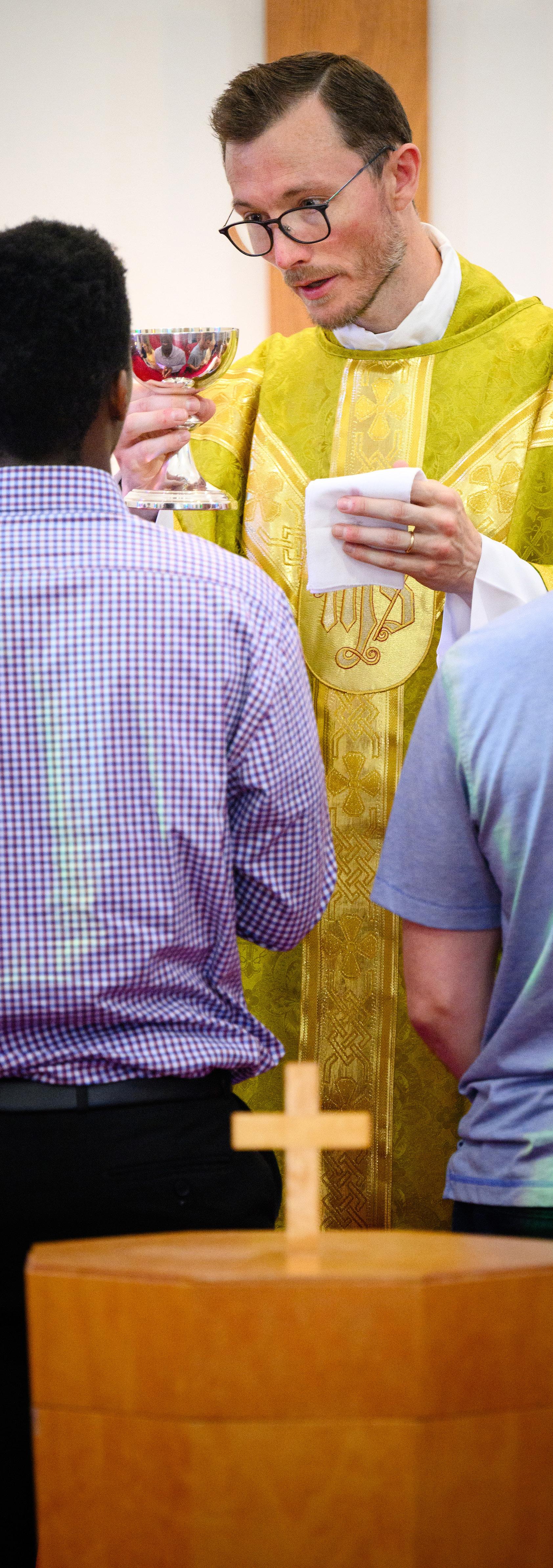

Deaconess Rosie Adle has served as Assistant Director of Deaconess Formation at Concordia Theological Seminary, Fort Wayne, since 2010, teaching courses online as a deployed staff member. In the Q & A that follows, Deaconess Adle talks about her work and the vocation of deaconess.
Tell us a little about yourself. What attracted you to deaconess studies? Deaconess programs were opening in our synod’s seminaries right as I graduated from college (2003). My sister nudged me to consider applying for admission. Big sisters have all the good ideas, and this was another that panned out well! Growing up in a pastor’s family, I’d shared in the bustle of both joys and sorrows related to congregational life. In so many ways, ongoing service in the church represented a blessed extension of the foundation that the Lord had already worked in me through my loving upbringing in the faith.
For those who might not know much about deaconesses, what do deaconesses do? How does seminary education equip them to serve God’s people? Some think that a deaconess is helpful because she tends to the various aspects of ministry that the pastor doesn’t have time for. I reflect more on how the deaconess does not pick up the slack of the pastor, but of the parish. And what a beautiful

image! The church is called to mercy. Where does this lead a deaconess who’s been equipped at the seminary? Where there’s a lonely person, she visits, listens patiently, and shares the love of Christ. Where there’s a mean pot after a funeral lunch, she scrubs with all her might. Where there’s an LWML group, she receives the prayer requests, holds them in her heart, and brings them boldly to our heavenly Father. In these ways, and so many others, a deaconess can carry out the exhortation given to the church in Galatians 6:2 to bear one another’s burdens and so fulfill the law of Christ. She has been formally prepared for just such service!
What do you teach here at CTSFW? What’s your favorite course to teach, and why? I’ve taught online Deaconess Practicum classes for CTSFW to both first- and second-year distance deaconess students since 2010. These classes aim to prepare our students for ongoing service in congregational, institutional, or mission settings. By God’s grace, I get to fill up our deaconess students with resources, encouragement, and direction for the journey they’re on. I’d compare it to loading a backpack with the knowledge, wisdom, skills, character, fortitude, and diaconal spirit that we anticipate will be most useful for them as they move forward. These courses are highly practical; they’re also filled with caring interaction and attention to individual student needs and growth. Over a grand total of sixty
Left to right: Deaconess Rosie Adle on a CTSFW visit to Concordia University, Nebraska; The Adle family; Mercy project (hurricane buckets) at Zion Lutheran Church in Imperial, Nebraska.
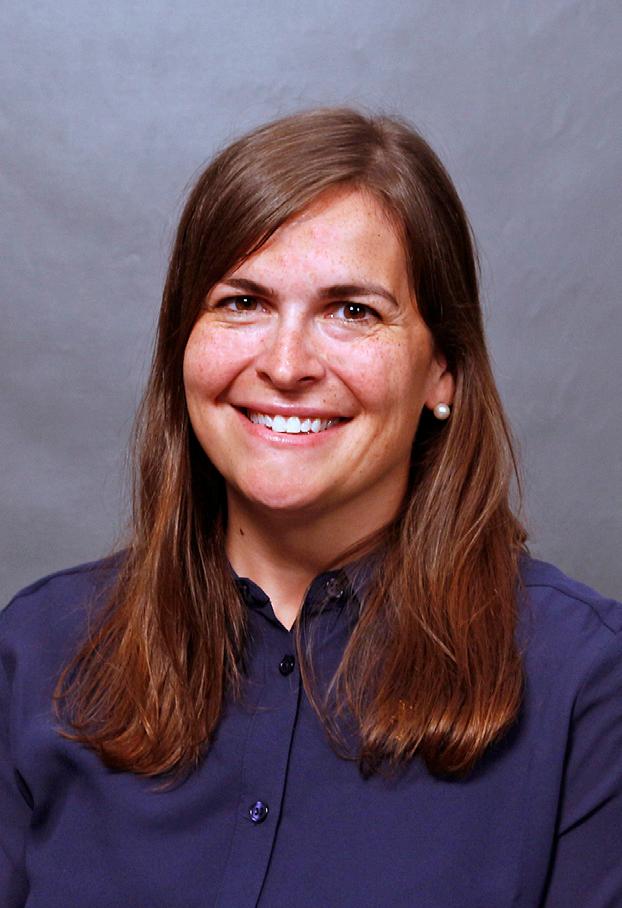

weeks in Practicum (fifteen weeks in both the fall and spring quarters; two years running), we cultivate together the kind of sisterly bonds that endure beyond graduation and placement. We downright love one another. Ask a distance deaconess student. She’ll tell you!
What changes have you observed in deaconess formation and service (or in the church, generally) in the years you’ve been serving? Deaconesses in the LCMS remain constant in our commitment to serve in fitting ways that respect and honor God’s Word. While doing so, we keep our eyes and ears open, that we might recognize and respond to shifting needs in the church and world. A specific change I’ve seen during my years as a deaconess is the addition of the distance option for deaconess formation. This makes it possible for more women to consider this opportunity!
What has been most rewarding to you as an instructor? I love the uniqueness of each student, alongside the common endeavor to serve. Regardless of personality, preferences, and particularities of placement, a deaconess can be a leading force for the rest of the baptized to participate in the church’s life of mercy. I am honored to see this impulse and preparation grow in each student through the Spirit at work. When deaconesses are placed, they are ready to show the world what diakonia looks like and why it matters. The
deaconess student grows into a doer as well as a model and motivator for others who are invited to serve according to their Christian gifts. She does so as a humble servant, grounded in God’s Word, upholding Lutheran teaching and practice. Christ lives in her, and, at the invitation of the church, the deaconess listens and prays, she lives and moves, all in glad service to others. Seeing this take shape in our students is amazing!
What’s your best advice for someone who is thinking about becoming a deaconess? Rev. Wilhelm Löhe in his poem “The True Deaconess Spirit” starts by asking “What is my want?” If your answer is, “I want to serve,” you’re on your way! Pray about it, talk to your pastor, and contact CTSFW to hear more!
The theme for this issue of For the Life of the World is “The Confident Confession in Action.” How does that theme play out in the service of deaconesses? Romans 12 directs those who do acts of mercy to do so with cheerfulness. As a lady named Rosie, this is an exhortation that I can really get behind! I’ve met lots of deaconesses, though, and regardless of name, there is genuine joy and gladness for all in the call to confess the faith in word and carry out acts of mercy in deed. We deaconesses have something to smile about. Our confidence is in the Lord!
Dr. Paul Grime, Professor of Pastoral Ministry and Missions and Dean of the Chapel at CTSFW, spent a few hours on Zoom October 13 delving into the resources of the Lutheran Service Book (LSB) with church workers of the China Evangelical Lutheran Church, a partner church of The Lutheran Church—Missouri Synod (LCMS) in Taiwan. The Rev. Michael Paul, a theological educator in Taiwan, translated. Paul has served as chief editor of the Chinese LSB; a pilot edition was produced in 2019.
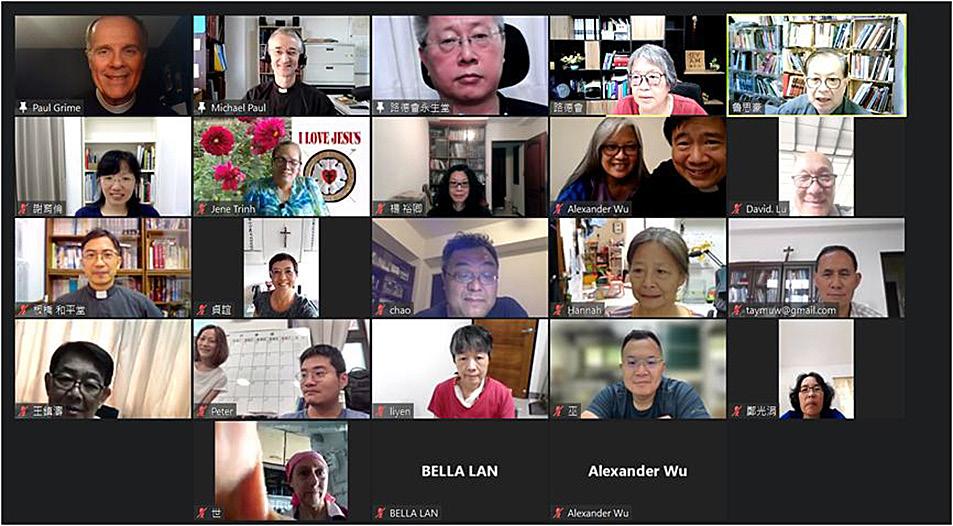

Dr. David Scaer’s book Baptism in the Confessional Lutheran Dogmatics series (Luther Academy, 2015) will soon appear in Chinese. The book was translated by Xiaokang Wei, a student in the Master of Arts program at CTSFW.
Below, Wei (center) and Scaer, the David P. Scaer Chair Emeritus of Biblical and Systematic Theology (right), are pictured with Dr. Robert Bennett, Executive Director of Luther Academy.
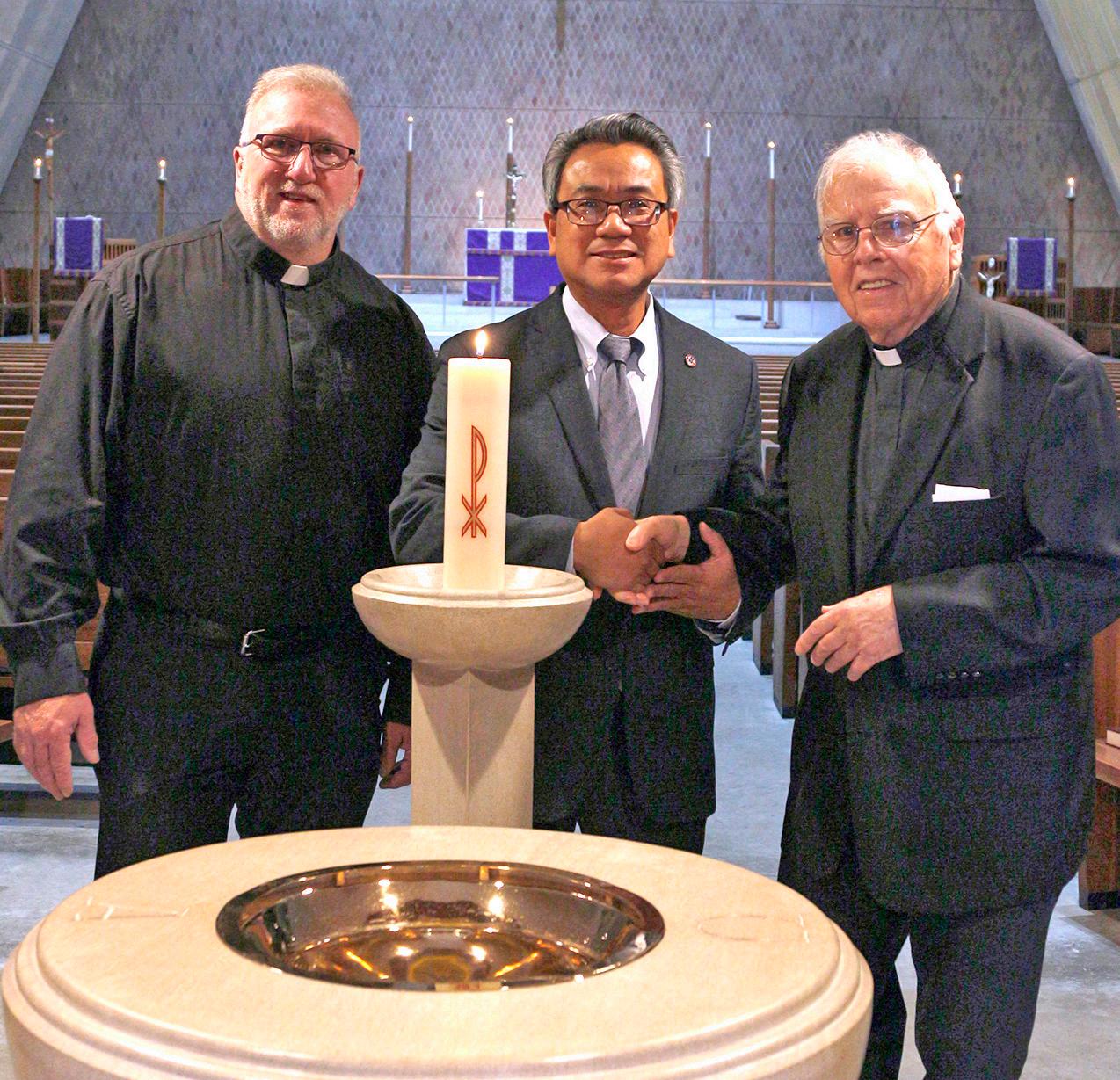

Dr. Samuli Siikavirta of Helsinki, Finland, was installed as Assistant Professor of Exegetical Theology December 2 at Concordia Theological Seminary, Fort Wayne (CTSFW). CTSFW President Dr. Jon Bruss preached at the service, and Indiana District President D. Richard Stuckwisch conducted the installation.
“I was greatly encouraged by the installation service and the Word of God preached by President Bruss,” said Siikavirta, who was joined at the service by his wife, Māra, and his daughter, Lidia. “When the Lord gives us new challenges and big shoes to fill, it is easy to fall into fear and hide our talents in the ground. In Christ, however, we may move on boldly, trusting in the grace and mercy of our Lord. I am excited to begin this new phase in my ministry in His service at CTSFW.”
Siikavirta holds several degrees from the University of Cambridge, including a PhD in divinity (2015). His prior teaching experience includes serving as a visiting scholar at CTSFW in 2013 and teaching New Testament Greek at Cambridge colleges and at Westfield House in Cambridge, which for many years has served as a study abroad option for CTSFW students.
He also brings with him a decade of parish experience. After being ordained in the Evangelical Lutheran Mission Diocese of Finland (ELMDF) in 2014, Siikavirta was called to serve as associate pastor at St. Mark’s Lutheran Church in Helsinki. In 2016, he was called as head pastor at St. Mark’s, where he served until coming to CTSFW.
“Our seminary faculty rejoices at the installation of Dr. Siikavirta,” said CTSFW Provost Dr. Charles Gieschen. “His substantial experience as a confessional Lutheran pastor in Finland and his careful study of the New Testament Scriptures cultivated at the University of Cambridge will now be a great blessing to the formation of our students in Jesus Christ as faithful Lutheran pastors and deaconesses.”

CTSFW President Jon Bruss, Dr. Detlev Schulz, and Dr. Scott Murray, chair of the CTSFW Board of Regents, attended the International Church Relations Conference in Wittenberg, Germany, October 21–25. Nearly 100 Lutheran leaders from around the world gathered for the conference, the theme of which was “Christ the Lord of History, Yesterday, Today and Forever” (Heb. 13.8). Pictured here are conference attendees with ties to CTSFW.

The International Lutheran Council (ILC) held its Third Commencement of the Lutheran Leadership Development Program (LLDP) at Concordia Theological Seminary, Fort Wayne (CTSFW) November 15, 2024, presenting program graduate Bishop Yohana Ernest Nzelu (South East of Lake Victoria Diocese of the Evangelical Lutheran Church in Tanzania) with a Certificate of Theology in Lutheran Leadership. Nzelu’s thesis: “An Examination of the Contribution of The Lutheran Church—Missouri Synod to the Growth of ELCT—South East of Lake Victoria Diocese.” Faculty members in attendance included Dr. Paul Grime, Professor John Pless, Dr. Naomichi Masaki, Dr. Jon Bruss, Dr. Charles Gieschen, and Dr. Detlev Schulz, along with LLDP instructor Dr. Jeffrey Skopak

Eighteen artists answered the call to submit artwork for the Fifth Biennial Exhibition of Sacred Visual Art, sponsored by the Good Shepherd Institute of Concordia Theological Seminary, Fort Wayne (CTSFW). The exhibit, “Singing of Jesus Christ,” marked the 500th anniversary of the first Lutheran hymns and hymn collections by inviting artists to submit pieces inspired by four Luther hymns from the 1524 hymn collection:
@ “Dear Christians, One and All, Rejoice” (LSB 556)
@ “Come, Holy Ghost, God and Lord” (LSB 497)
@ “In the Very Midst of Life” (LSB 755)
@ “We Praise You, Jesus, at Your Birth” (LSB 382)
Four pieces of art, featured on the facing page, were selected for special honors by juror Justin Johnson, who serves on the art faculty at St. Francis University in Fort Wayne. Johnson has been the gallery director for the university for over twenty years and curates their art collection.
“As artists, we are called to use our gifts to serve our families, the greater community, and most importantly, our Lord,” said Johnson. “Each artist in the exhibition has fulfilled that, sharing their work with the greater community. I was impressed by the variety of approaches to the hymns of Martin Luther and the diverse techniques incorporated into each work of art.”
The exhibit will remain on display in The Wayne and Barbara Kroemer Library at CTSFW through the end of January 2025.


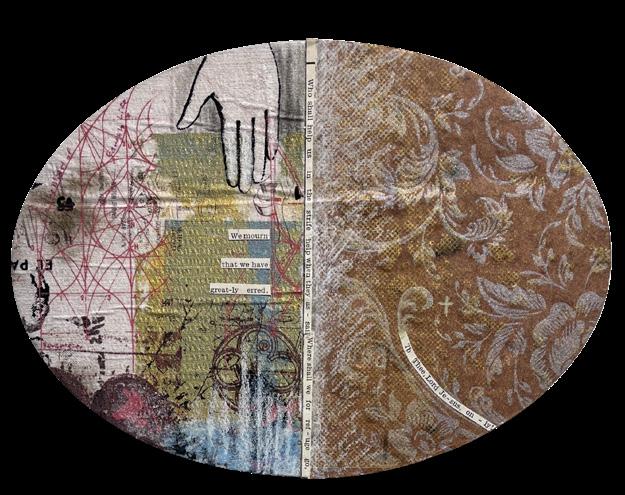

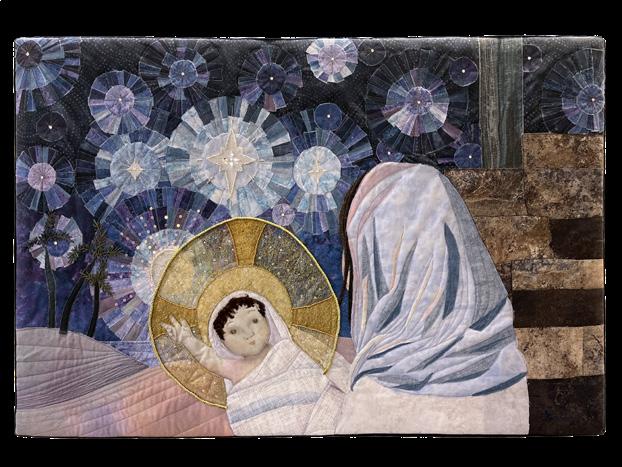
FIRST PRIZE: “Thy Precious Blood”
ARTIST: Kandis Phillips
INSPIRATION: “In the Very Midst of Life” (LSB 755)
FROM THE ARTIST: This medieval-style illumination, based on stanza 3 of the hymn, is painted with handmade watercolors and shell gold on calfskin. The white rose represents Christ’s divinity and human nature. The four thorns that pierce the petals are emblems of the four corners of the earth and of our sins, with his blood taking the shape of a cross (Is. 53:5). The scene of rose and thorns forms a circle, the eternal reality of Christ’s atoning sacrifice.
SECOND PRIZE: “In the Very Midst of Life”
ARTIST: Debra Swearingen
INSPIRATION: “In the Very Midst of Life” (LSB 755)
FROM THE ARTIST: Martin Luther said, “In the midst of life, we die,’’ though not without refuge. The Lord sets us within the Church, where the Word is rightly preached and the Sacraments rightly administered. Although death rages all about, Luther wrote that the coffin is but a “little bed of rest’’ before the blessed promised resurrection. Conversely, the fiery pit claims the eternal dead, where there is unquenchable torment of conscience.
HONORABLE MENTION: “We Mourn That We Have Greatly Erred” and “Thy Heart Is Moved with Tenderness”
ARTIST: John Bergmeier
INSPIRATION: “In the Very Midst of Life” (LSB 755)
FROM THE ARTIST: “We Mourn”: The hymn text refers to the confession of our sins, yet in the same breath asks for God’s mercy and help. Here we see in the midst of the daily business and drama of life how God’s hand reaches down, offering refuge, as well as our recognition that it is only available through Jesus.
“Thy Heart”: The hymn proclaims God’s love for us, His heart moved with such tenderness that He sent His only Son to earth to be sacrificed for our sin. We offer prayers of thanks to Him and confess that He is a righteous and holy God who has heard our pleas for mercy.
AUDIENCE CHOICE AWARD: “Keeper of the Earth, Sea, and Sky”
ARTIST: Amanda Doster
INSPIRATION: “We Praise You Jesus, at Your Birth” (LSB 382)
FROM THE ARTIST: Drawing inspiration from the third stanza, ‘‘Upon her lap, content is He, Who keeps the earth and sky and sea,’’ I wanted to explore the juxtaposition of the two natures of Christ. As a mother, I marvel at Mary’s position: holding the tiny, helpless infant through whom all creation came into being. The art was created with raw-edge appliqué quilting, hand embroidery, and beading techniques.
By Daniel Burfiend
Saint John’s Lutheran Church in Cheboygan serves a beautiful lake community in the far northern portion of Michigan’s lower peninsula. While faithfully proclaiming the Gospel and serving that community’s needs, the congregation began to learn more about the opportunity to serve the wider church through Concordia Theological Seminary, Fort Wayne (CTSFW).
Their pastor, Rev. Michael Schaedig (CTSFW 2003), encouraged members to support the spread of the Gospel through the work of the seminary. They also became more closely acquainted with the seminary when a student preached at the congregation and the grandson of a member began attending CTSFW. In response, one member of the congregation offered to match up to $10,000 of whatever the congregation raised for the seminary.

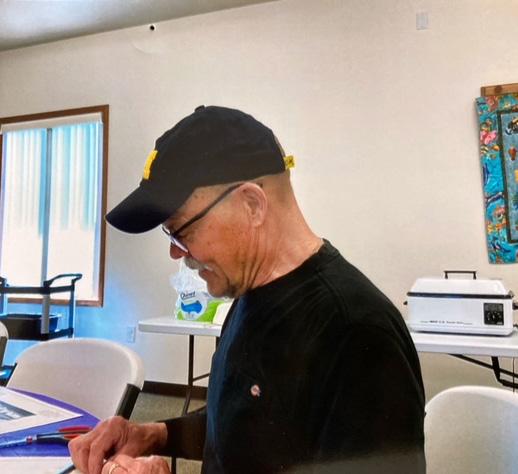

The congregation worked hard to match that $10,000 challenge. They hosted a Seminary Sunday to learn more about God’s work through CTSFW and held two fundraising events. The congregation gave generously, raising enough to meet the $25,000 minimum to establish an endowed scholarship, which will be invested and used to support the formation of future pastors for as long as CTSFW exists.
The members of St. John’s are partnering with other Christians in giving sinners—not only in Cheboygan but around the world— the most important gift, the forgiveness of sins and eternal life. Furthermore, by establishing an endowment, they are looking to serve not only their own generation but their grandchildren and however many more generations will be born before Christ returns.
Please consider joining the saints at St. John’s by investing the perishable riches entrusted to you by God in the imperishable riches of Christ’s Word of forgiveness. While other investments may fail, the Word of God does not return void, but it will go forth and accomplish that which our Lord desires (Is. 55:11). And in eternity with Christ, you may sing the praises of the Lamb alongside the very people who heard and believed the Good News proclaimed by a pastor whom you supported.

The Rev. Daniel Burfiend serves as an Advancement Officer at Concordia Theological Seminary, Fort Wayne.




By the Kantorei of Concordia Theological Seminary, Fort Wayne
The Kantorei will visit churches in California, with a concluding Lenten Evening Prayer service at CTSFW’s Kramer Chapel on Sunday, March 23, at 4:00 p.m. For a complete itinerary visit our event page at ctsfw.edu/Events.


All classes are invited. We will celebrate class years that end in 5 and 0. REGISTER TODAY!
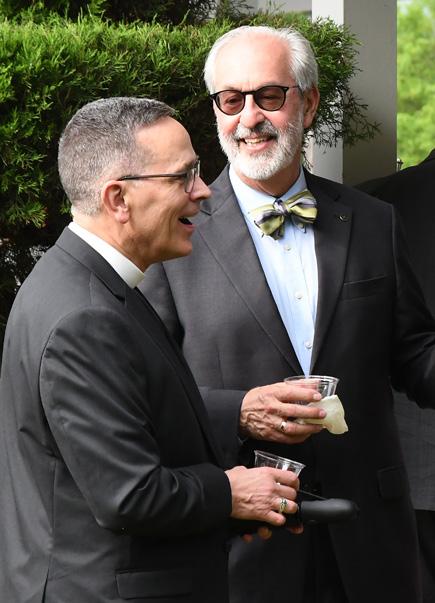

22–23, 2025
Retreat, relax, and reconnect with fellow classmates on the campus of Concordia Theological Seminary, Fort Wayne.
To register or for more information scan the QR code or visit us at ctsfw.edu/alumni-reunion.
Questions? Contact LeeAnna Rondot at LeeAnna.Rondot@ctsfw.edu or (260) 452-2204.


Monday, January 20, 2025
Presented by the Rev. Dr. David Petersen

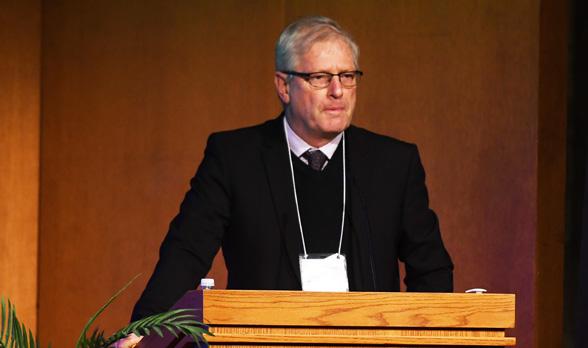



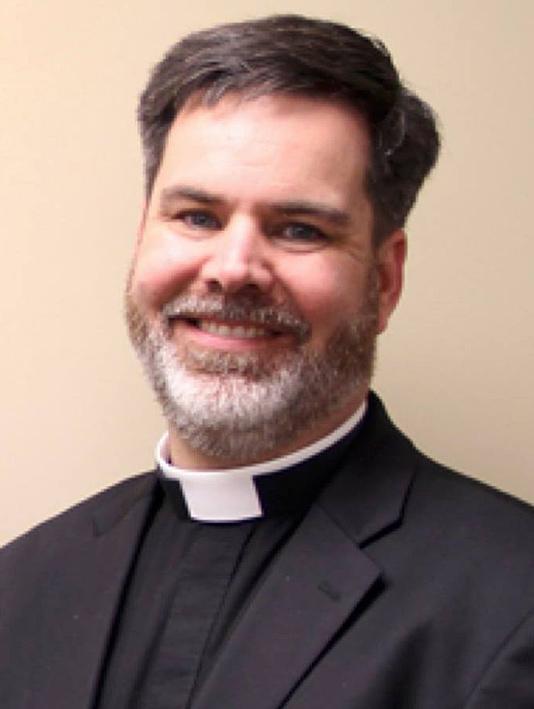
For more information or to register online scan the QR code or visit our website at ctsfw.edu/LPW.

An annual highlight at CTSFW, the Symposia Series is a four-day event consisting of two symposia.
40th Annual Symposium on Exegetical Theology
The Biblical Foundation of the Nicene Creed
January 21–22, 2025
48th Annual Symposium on the Lutheran Confessions
The Council of Nicaea 1700 Years Later: Old and New Controversies
January 22–24, 2025
For more information and online registration for the Symposia Series, please visit ctsfw.edu/Symposia or scan the QR code.




Giving Tuesday
Six historic Model B3 chairs in Kroemer Library, popularly known as “Wassily chairs,” have been beautifully restored, thanks to the generosity and skill of Cliff and Chris Fegert.
The iconic chairs, designed by Marcel Breuer in the 1920s, have been in use in the library for years. Over time, the chairs became worn, and three went into storage after the leather seats broke along the seam.
When the Fegerts attended Luther Hostel in 2022, they noticed the chairs on a tour of the library. After speaking to Prof. Robert Roethemeyer, The WakefieldKroemer Director of Library and Information Services, Cliff offered to restore the chairs, taking one home with him to work on.
This year, he returned with Chris to complete the restoration on site, using thick American-raised harness leather and double-stitching to ensure durability for years to come.
“The Fegerts arrived a day early with the Wassily chair they had restored along with the tools and enough leather to restore the remaining five chairs,” said the Rev. Roger Peters, assistant director of Library and Information Services, noting that the Fegerts spent about ninety minutes to restore each chair.
“We’re grateful that the Lord brought Cliff and Chris to Luther Hostel in 2022, and that he gave them generous
hearts to do this work for us,” Peters added. “By sharing their time, talents, and gifts with us, they have restored these classic, treasured chairs.”
John and Ruth Sovis of Twinsburg, Ohio, recently donated a beautiful grand piano to the seminary in memory of their daughter, Sheila Lynn Sovis, who was called to her heavenly home in 2023. The piano was dedicated November 11 during the Good Shepherd Institute Conference and was then played in a short recital featuring Dr. Jonathan Young, a pianist, teacher, composer, and accompanist on the piano faculty at Purdue University Fort Wayne, and vocalist Natalie Young, associate artistic director and soprano principal vocal artist at Heartland Sings of Fort Wayne. The Sovises also established an endowed scholarship named in honor of Sheila for students involved in music at the seminary.
This year’s Giving Tuesday campaign in December in support of faithful formation at CTSFW was a resounding success, with generous donors giving a total of $89,260 (including a $25,000 matching gift that kickstarted the campaign). That’s almost double the $50,000 goal for the campaign. Soli Deo gloria!
By Kristine Bruss
When Corrie Steel receives his first call to serve as a Lutheran pastor, he will have spent six and a half years in seminary. That’s a long road to ordination, but it’s the path Steel wants to follow. After a somewhat bumpy two and a half years of seminary education in his home country of Australia, Steel has come to Concordia Theological Seminary, Fort Wayne (CTSFW), to be “properly trained” in Lutheran theology and practice.
“When I studied Greek and Hebrew in Australia, it wasn’t that intensive,” Corrie said. “The lecturer did a good job with the time allocated, but it was only one semester (around forty hours), and we never used Greek again in any other classes. I thought, ‘I can’t read the Bible in Greek yet. I’m not really properly trained.’ We had heard about Fort Wayne a lot. I had talked to some pastors who had done some training here, and they really raved about it.”
So Steel and his family, including his wife, Dianne, and four daughters–Cate, Eloise, Sylvie, and Adeline–sold their house, packed up their things, and made the move to Fort Wayne this past summer, ready for a new adventure.
Neither Corrie nor Dianne were raised Lutheran. When Corrie was around eight years old, his family joined the Brethren Church, which he describes as similar to the Baptist Church. Dianne was raised in the Catholic faith and later made the move to the Brethren Church, where she met Corrie.
“They don’t have pastors in the Brethren Church,” Dianne explained. “They have elders, and Corrie used to do some preaching.”
When their daughter Cate came along, Corrie, then a high school teacher, felt a responsibility to teach her the faith, but he realized he didn’t know the Bible that well. He started reading, and questions emerged.
“Every time I tried to read my Bible, it really didn’t agree with what I was being taught,” Corrie said. He started searching and found a few podcasts, including Fighting for the Faith and Issues, Etc.
“I just realized that Lutherans had it right. This is what the Bible teaches.” He and Dianne joined the Lutheran Church of Australia (LCA) in 2015.
Corrie continued to read his Bible and began teaching a Bible study over lunch at the Christian school where he was teaching. “I really wanted to focus on being saved by grace through faith, because all the students were getting there was a lot of Law. You know, ‘Do these five things to live this way.’”
Eventually, his Bible study was shut down, but he had discovered his passion; he loved being in God’s Word and teaching the faith. He applied to the LCA seminary, Australian Lutheran College, in Adelaide.
“We had been talking about going to the seminary for a while, and teaching those kids was what I really enjoyed at the time.”
Corrie completed the first year of seminary online, which he was allowed to do because of his distance from the seminary, but he planned to move south to Adelaide for his remaining three years. “You do need to be around other people,” said Corrie.
The first year went well, especially with the confessional lecturers at the seminary, and the whole family was looking forward to the move. Just before the Steels were going to put their house on the market, though, Corrie found out that the confessional lecturers had been put on a half call, and lectures would all be online. (At this point in time, the LCA was embroiled in a debate over women’s ordination, a practice that was approved in 2024).
“The confessional lecturers basically all left,” said Corrie. “The seminary started farming us out to other denominations, and they were really liberal. So we were doing subjects through the Anglicans or through the United Church.”
Corrie started thinking about going overseas to study. He toughed it out for another year and a half, during which time he heard talk of starting an alternative church body, Lutheran Mission-Australia (LM–A).
“They said, ‘Eventually we’ll want a seminary, but in the interim, we can send you guys overseas.’ It wasn’t a definite plan then, but when we did get the definite word that the plan was a go, we had just a few months to tie up all our affairs,” Corrie said.
“We didn’t feel settled in our house, anyway,” Dianne added. “We had been thinking about moving to Adelaide, then didn’t. We were ready to do something.”


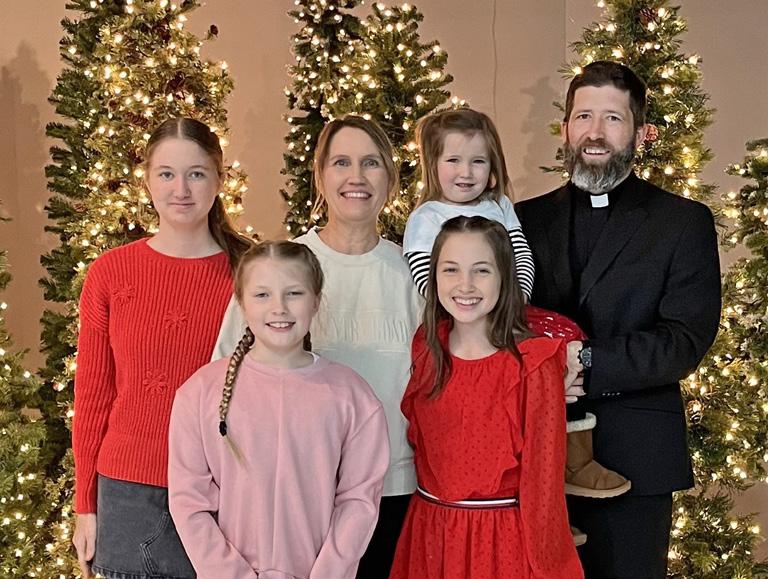

The move to Fort Wayne, both Steels say, has been very smooth. Everyone has been welcoming, and they’ve been thrilled with the Lutheran school options, which didn’t exist in Australia. Cate is enrolled at Concordia Lutheran High School, Eloise and Sylvie are at Ascension Lutheran School, and Adeline is at home (but says she’s ready for preschool).
Corrie has been assigned to Emmaus Lutheran Church and School for his two years of field education, which he’ll complete along with his coursework. After that, he’ll have a vicarage year, then one more year of classes. He could have gone to St. Catherines in Canada and transferred credits, he says, but he wanted to start from scratch.
“The LCA isn’t in altar-and-pulpit fellowship with the LCMS, and I just wasn’t confident in my previous seminary studies. So I said, ‘Give me the full program.’”
The workload here, Corrie says, is a lot heavier. He’s
enjoying it, but it’s hard. “I’m from North Queensland, and North Queensland is very laid back,” he said with a laugh. “In the last semester in Australia, when I knew I might be leaving, I still managed to work three days a week and get everything done and pass everything. That’s not flying here.” He only wishes he had more time to take things in a bit more.
When he finishes his MDiv program, Corrie and his family plan to return to Australia, where, God willing, he’ll serve a congregation, confident in his theological knowledge and well-equipped to teach others the faith.
“This was a big move,” Dianne said, “but it’s just what we needed to settle us all—in where we had to be and where we were meant to be.”

Dr. Kristine Bruss is Chief Communications Officer at Concordia Theological Seminary, Fort Wayne.
Rachel James offers a taste of Taiwan at the International Food Festival October 18. The event, hosted by the International Studies Office, provides an opportunity for students, faculty, and staff to enjoy homemade national and ethnic dishes prepared by members of the CTSFW community.

Seventh- and eighth-grade students from St. John’s Lutheran School in Marysville, Ohio, unload donations collected for the seminary’s Food Co-op on October 30. The students traveled to CTSFW with the Golden Eagles, a senior ministry group from St. John’s Lutheran Church. The Golden Eagles bring students with them every other year on their annual trip to Fort Wayne.

Members of the Schola Cantorum sing at the Good Shepherd Institute (GSI) Hymn Festival November 11 in Kramer Chapel. The GSI conference, held November 10–12, celebrated the 500th anniversary of Lutheran hymns.




It was all smiles after fourth-year student Alexander Hinojosa’s successful theological interview with Dr. Todd Peperkorn and Dr. Walter Maier III December 11. Faculty use the theological interview to assess what students have learned to date and to certify them for ordination.
Deaconess Katie Aiello (Admission), Rev. Roger Peters (Kroemer Library), and Dr. Ben Mayes (Historical Theology Department) were just a few of the faculty and staff members who rose to the challenge to don an ugly sweater for the annual president’s Christmas reception the morning of December 13.
On December 15, Dr. Paul Grime, Dean of the Chapel, gathered with his chapel student workers in the afternoon and mentee group in the evening to assemble care packages for the homeless.

Lenten Preaching Workshop
Monday, January 20, 8:30 a.m.–4:00 p.m.
Information: ctsfw.edu/LPW
Symposia Series
January 21–24
Information: ctsfw.edu/Symposia
Epiphany Evening Prayer with the Kantorei
Tuesday, January 21, 5:00 p.m. in Kramer Chapel

Vespers and Organ Recital
Wednesday, January 22, 5:00 p.m. in Kramer Chapel
Symposia Choral Vespers
Thursday, January 23, 5:00 p.m. in Kramer Chapel

Seminary Guild
Tuesday, February 11, 1:00 p.m.
Information: ctsfw.edu/SemGuild or (260) 485-0209
Christ Academy Confirmation Retreat
February 21–23
Information and registration: ctsfw.edu/Confirmation Contact: ChristAcademy@ctsfw.edu or (260) 452-3140
Seminary Guild
Tuesday, March 11, 1:00 p.m.
Information: ctsfw.edu/SemGuild or (260) 485-0209
Prayerfully Consider Visit
March 20–22
Information: ctsfw.edu/PCV or (800) 481-2155
Lenten Evening Prayer with the Kantorei
Sunday, March 23, 4:00 p.m. in Kramer Chapel
Seminary Guild
Tuesday, April 8, 12:00 p.m.
Information: ctsfw.edu/SemGuild or (260) 485-0209
Easter Evening Prayer
Sunday, April 27, 4:00 p.m. in Kramer Chapel

Vicarage and Deaconess Internship Assignment Service
Monday, April 28, 7:00 p.m. in Kramer Chapel
Candidate Call Service
Tuesday, April 29, 7:00 p.m. in Kramer Chapel
Alumni Reunion
May 22–23



Information: ctsfw.edu/alumni-reunion or (260) 452-2204
Baccalaureate
Friday, May 23, 10:00 a.m.
Commencement Organ Recital Friday, May 23, 2:00 p.m.
Commencement Ceremony Friday, May 23, 4:00 p.m.
Organist Workshop: Beginner Level
June 2–6


Information and registration coming Spring 2025 Contact: LeeAnna.Rondot@ctsfw.edu or (260) 452-2204
Organist Workshop: Intermediate & Advanced Level
June 9–13
Information and registration coming Spring 2025 Contact: LeeAnna.Rondot@ctsfw.edu or (260) 452-2204
Christ Academy Family Institute
June 12–14
Information and registration coming February 1 Contact: ChristAcademy@ctsfw.edu or (260) 452-3140
Christ Academy High School
June 15–28
Information and registration: ctsfw.edu/CAHS Contact: ChristAcademy@ctsfw.edu or (260) 452-3140
For full details and updates, please visit ctsfw.edu/Events, scan the QR code, or call (260) 452-2100. Events are subject to change. Services and lectures will be livestreamed at ctsfw.edu/DailyChapel or facebook.com/ctsfw

June 12–14, 2025
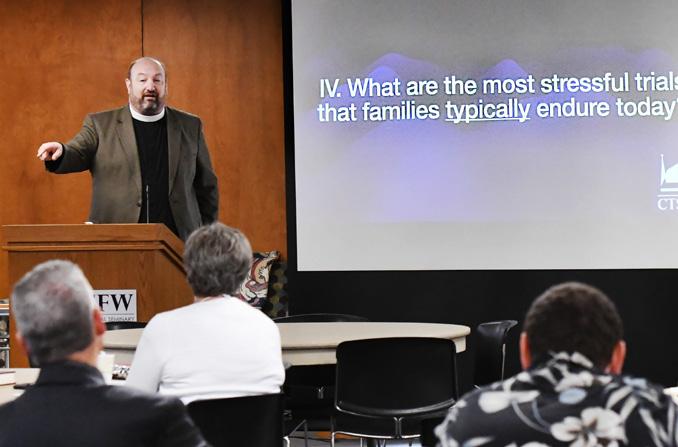
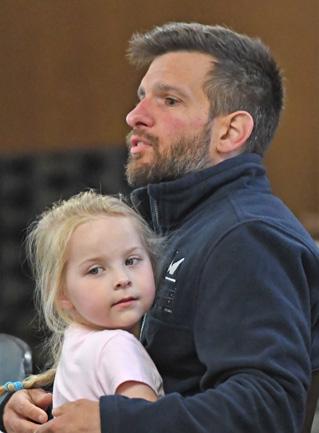
Christ Academy Family Institute (CAFI) is perfect for parents, families, and church workers interested in growing in their care and love for one another and passing on the faith to future generations.
For more information visit ctsfw.edu/CAFI.
February 21–23, 2025 September 19–21, 2025

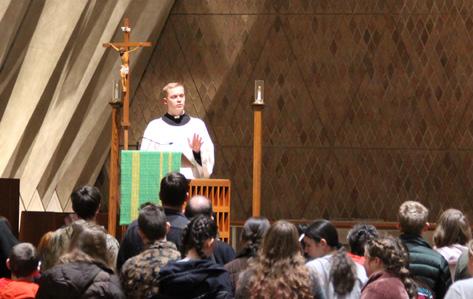


n Class sessions with our world-class faculty
n Fun, engaging community
n Faithful confessional leaders
n Impact that lasts a lifetime



Timothy School and Phoebe School are open to high-school-aged young men and women who are interested in exploring pastoral ministry (men), deaconess service (women), studying theology, and forming lasting friendships.


June 15–28, 2025
Applications now open!


By Peter J. Scaer
Paul writes, “If you confess with your mouth that Jesus is Lord and believe in your heart that God raised him from the dead, you will be saved” (Rom. 10:9). Christians are called to speak about that which their heart holds dear. Christians are called to be people of the truth, for Christ is the truth, and it is the truth that sets us free (John 8:31–32). We must never spread the lie, must never pretend that a woman can become a man, must never say that 2 + 2 = 5.
to confess, to say to others what Christ has spoken to us in the Scriptures. And there are eternal consequences for preachers and for their hearers. To the faithful our Lord gives the crown of everlasting life. Likewise, the people of God are called to listen to and support faithful pastors who preach the truth in season and out.
What does our Lord say to his apostles in Matthew 10:32–33?
The power of faith and confession comes not from within but is itself a gift.
Even as exercise makes our body stronger, so also must we exercise our faith. We confess Jesus in our prayers, in our hymns, and in the ancient creeds of the Church. But for our day, the simplest creed may be the most significant, namely, “Jesus is Lord.” To say such a thing is wonderfully basic but deeply profound. When we say that Jesus is Lord, we are saying that we belong to him. When we say that Jesus is Lord, we are saying that we will do what he says, that our lives will conform to his, that we will seek his approval alone, and that in all things we will say, “Thy will be done.”
To paraphrase Luther’s Small Catechism, we cannot by our own reason or strength believe in Jesus Christ our Lord. The power of faith and confession comes not from within but is itself a gift. Read the story of Peter’s confession (Matt. 16:13–17) and find out what Paul has to say on the matter (1 Cor. 12:3). Who enables us to say that Jesus is God’s Son, and that he is our Lord?
Pastors are called to be prophets, to speak the Word of God, especially in face of opposition and danger. That is the essence of confession. Ministers are specially called
How are people to receive faithful preachers (Matt. 10:41–42)?
Read Romans 10:14–17. What does St. Paul teach us about the necessity of bold proclamation?
Many Christians do not feel confident and shy away from bold speech. This is true for many Christians who have difficulty expressing why marriage is between one man and one woman. In such a case, it is good to study the Bible, to read Genesis 1–2 as well as Mark 10:1–12. It is also good to remember that every child has a biological father and mother and deserves to know them as mom and dad. There is much to learn. But the first step in this process is to stand with the Lord and not be ashamed. Stand on God’s word, no matter what. If you are concerned, go to the Scriptures. Study the Bible. Ask your faithful pastor for guidance. Many people find it awkward to speak the truth about sexuality, especially as Paul talks about it in Romans 1:18–32. Remember that the world has never died for you, but the Lord has died for you.
Why is Paul not ashamed of the gospel (Rom. 1:16–17)? What does our Lord mean when he speaks about shame?
There is always the temptation to think that we can have our cake and eat it too. We like to think that we can be Christians on Sunday and go along with the world during the other six days of the week. If we love Jesus, we must embrace everything that he has done or said.
What teachings of Jesus do we need to follow (Matt. 28:20)?
Can we be proud of our Lord and yet distance ourselves from what he says (Luke 9:26)?
Was our Lord ashamed of us (Phil. 2:5–11)?
What sorts of shame did our Lord endure as he went to the cross (Matt. 27)?
Many of us are afraid to speak because we are afraid of what others will think and say about us. We want to be liked, and we do not want to be labeled as “one of those Christians.” Our Lord speaks about rewards. If we seek the praise of people, we will have that, but nothing more. Instead, we should seek a heavenly reward (Matt. 6:1–4). The apostle Peter is known for denying our Lord three times (Matt. 26:69–75).
Have you ever been afraid to claim allegiance to the Lord?
What happens if we add or subtract from our Lord’s teaching (Rev. 28:18–19)?
Jesus is our Emmanuel, God with us (Matt. 1:21–23). In many ways, our life in the church is like being in a small boat, tossed about by the waves.
Read Matt. 8:23–27. What can we learn from the disciples when they feared that their boat would capsize?
Consider Peter’s boldness on Pentecost (Acts 2:14–42). Look at Peter speaking boldly before a council in Jerusalem (Acts 4:1–22). Peter and the apostles were beaten and told to be quiet. How did they react, and how did they speak about their suffering (Acts 5:27–42)?
Read Matt. 10:26–33. Should we worry when we feel alone? Should we think that God will abandon us?
When we confess Christ, we give glory to God. But even more, our neighbor needs to hear the Good News. When we speak up, even under pressure, the world knows that we are not kidding around. And when others hear us speak about Jesus, they may also come to believe and have life eternal. Remember that even in the worst times, the Lord is our shepherd, and he is with us (Psalm 23).

Dr. Peter J. Scaer serves as Professor of Exegetical Theology at Concordia Theological Seminary, Fort Wayne.
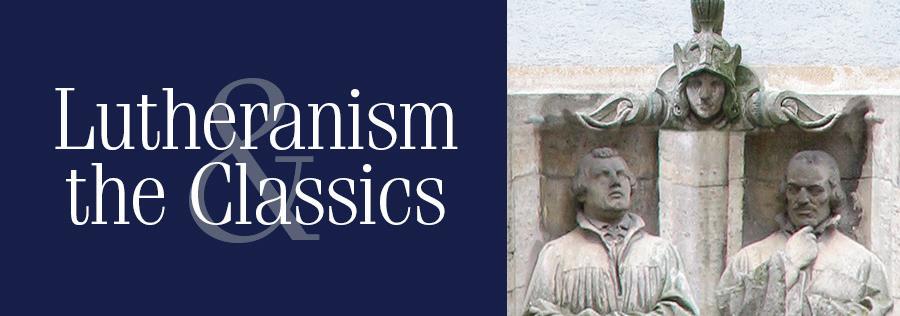

A sound education inspires curiosity in the cosmos and a desire to serve God and neighbor by pursuing legitimate vocations. The 2025 joint conference of Lutheranism and the Classics (L&tC) and the Consortium for Classical Lutheran Education (CCLE) aims to support, bolster, and enhance the emergence of classical education in our Lutheran churches and schools through an exploration of historical education as well as classical pedagogy and practice. Papers and panels will address topics including:
● The influence of Greco-Roman education on the Reformation
● The education of famous luminaries: Cyrus, Cicero, Caesar, Augustine, Luther, etc.
● Melanchthon, “praeceptor Germaniae”
● How music influenced the development of education
● The rise of Living Latin
● What does playing and/or recess have to do with education?
Registration for the conference opens January 9, 2025. For more information please visit ctsfw.edu/Classics.